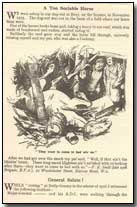Memoirs & Diaries - The Best 500 Cockney War Stories - General Salute! and Other Stories
 Published in London
in 1921, The Best 500 Cockney War Stories
comprised, in the words of its newspaper publisher (The London Evening
News) "a remembering and retelling of those war days when laughter
sometimes saved men's reason".
Published in London
in 1921, The Best 500 Cockney War Stories
comprised, in the words of its newspaper publisher (The London Evening
News) "a remembering and retelling of those war days when laughter
sometimes saved men's reason".
The collection of short memoirs, some 500 in total, is divided into five categories - Action, Lull, Hospital, High Seas and Here and There. This page contains five stories from Lull, led by General Salute!
Other sections within the collection can be accessed using the sidebar to the right.
General Salute!
While "resting" at Bully-Grenay in the winter of 1916 I witnessed the the following incident:
Major-General --- and his A.D.C. were walking through the village when an elderly Cockney member of a Labour battalion (a typical London navvy) stumbled out of an estaminet. He almost collided with the general.
Quickly pulling himself together and exclaiming "Blimey, the boss!" he gave a very non-military salute; but the general, tactfully ignoring his merry condition, had passed on.
In spite of his pal's attempts to restrain him, he overtook the general, shouting "I did serlute yer, didn't I, guv'nor?"
To which the general hastily replied: "Yes, yes, my man!"
"Well," said the Cockney, "here's anuvver!"
A. J. K. Davis (late 10th London Regt., att. 73rd M.G.C.), Minnis Croft, Reculver Avenue, Birchington
Wipers-on-Sea
Scene, "Wipers" ; Time, winter of 1917. A very miserable-looking R.F.A. driver, wet to the skin, is riding a very weary mule through the rain.
Voice from passing infantryman, in the unmistakable accent of Bow Bells: "Where y' goin', mate? Pier an' back?"
A. Gelli (late H.A.C.), 27 Langdon Park Road, Highgate, N.6
He Rescued His Shirt
During the latter stages of the war, with the enemy in full retreat, supply columns and stores were in most cases left far behind. Those in the advance columns, when marching through occupied villages, often "won" articles of underclothing to make up for deficiencies.
Camberwell Alf had a couple of striped "civvy" shirts, and had lent a less fortunate battery chum one of these on the understanding that it would be returned in due course.
The same evening the battery was crossing a pontoon bridge when a mule became frightened at the oscillation of the wooden structure, reared wildly, and pitched its rider over the canvas screen into the river.
Camberwell Alf immediately plunged into the water and rescued his unfortunate chum after a great struggle.
Later the rescued one addressed his rescuer: "Thank yer, Alf, mate."
"Don't yer 'mate' me, yer blinkin' perisher!" Alf replied. "Wot the 'ell d'yer mean by muckin' abaht in the pahny (water) wiv my shirt on?"
J. H. Hartnoll (late 30th Div. Artillery), 1 Durning Road, Upper Norwood, S.E.19
A Smile from the Prince
One morning towards the end of May 1915, just before the battle of Festubert, my pal Bill and I were returning from the village bakery on the Festubert road to our billets at Gorre with a loaf each, which we had just bought.
Turning the corner into the village we saw approaching us a company of the Grenadier Guards in battle order, with a slim young officer at the head carrying a stick almost as tall as himself. directly behind the officer was a hefty Guardsman playing "Tipperary" on a concertina.
We saluted the officer, who, after spotting the loaves of bread under our arms, looked straight at us, gave us a knowing smile and acknowledged our salute. It was not till then that we recognised who the officer was. It was the Prince of Wales.
"Lumme!" said Bill. "There goes the Prince o' Wales hisself a-taking the guard to the Bank o' England!"
J. F. Davis, 29 Faunce Street, S.E.17
"Just to Make Us Laugh"
We were one of those unlucky fatigue parties detailed to carry ammunition to the forward machine gun positions in the Ypres sector. We started off in the dusk and trudged up to the line.
The transport dumped the "ammo" at a convenient spot and left us to it. Then it started raining.
The communication trenches were up to our boot tops in mud, so we left them and walked across the top. The ground was all chalky slime and we slipped and slid all over the place.
Within a very short time we were wet through and, to make matters worse, we occasionally slipped into shell-holes half full of water (just to relieve the monotony!).
We kept this up all night until the "ammo" had all been delivered; then the order came to march back to billets at Dranoutre.
It was still pouring with rain, and when we came to Shrapnel Corner we saw the famous notice board: "Avoid raising Dust Clouds as it draws Enemy's Shell Fire."
We were new to this part of the line and, just then, the idea of raising dust clouds was extremely ludicrous.
I asked my pal Jarvis, who came from Greenwich, what he thought they put boards like that up for. His reply was typically Cockney: "I 'spect they did that just to make us laugh, as we cawnt go to the picshures."
Mack (late M.G.C.), Cathcart, The Heath, Dartford
Next - No Use Arguing with a Mule
Bulgaria mobilised a quarter of its male population during WW1, 650,000 troops in total.
- Did you know?
